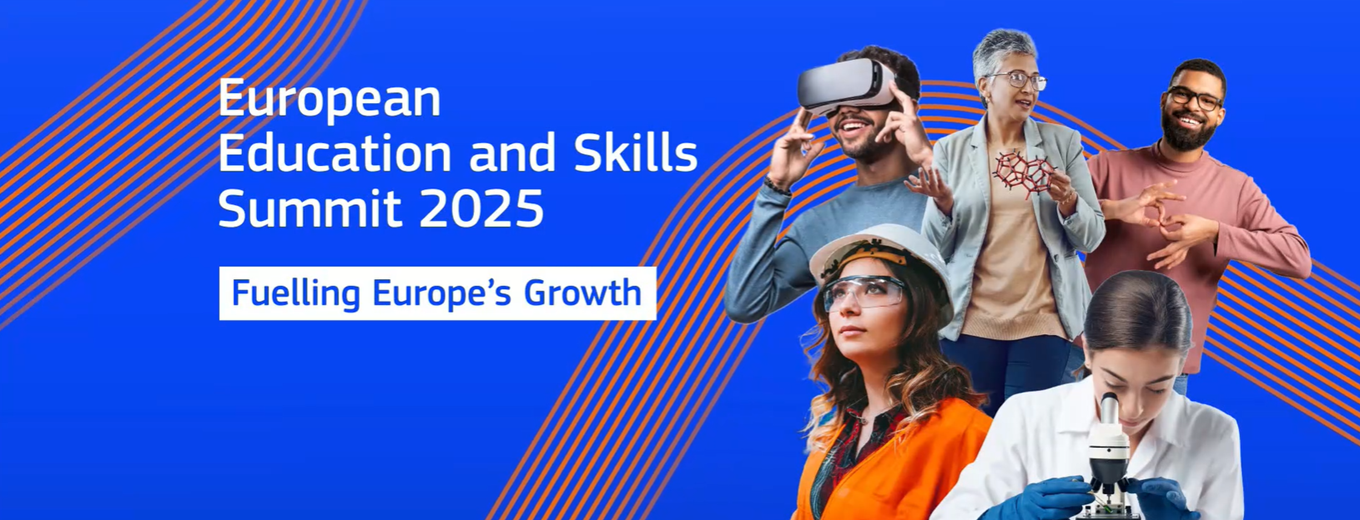The Education and Skills Summit explored reforms, industry-education partnerships, STEM shortages, and Europe’s strategy to attract and retain global talent.
The European Commission (EC) hosted a large flagship event, the Education and Skills Summit 2025, on 13 November in Brussels. Coinciding with the publication of the annual Education and Training Monitor (see SwissCore article), the conference addressed today’s most debated topics in the educational policy field, spanning sessions from basic and citizenship skills, to the lack of STEM students and the challenge of talent attraction.
The event opened with keynotes by EVP Roxana Mînzatu and Ms Britta Seeger, Member of the Board of Management of the Mercedes-Benz Group, with the latter introducing an industry perspective on the importance of public-private partnerships for education, AI skills, and dual learning tracks. In her opening address, Ms Mînzatu stressed the urgency to reform European education systems and thereby improve their ability to foster European competitiveness and overcome skills shortages. She particularly highlighted initiatives forthcoming under the EC’s 2026 education package, including European school alliances, the Basic Skills Support Scheme and the 2030 Roadmap on the future of digital education and skills.
In the following, future-proofing education through industry-education partnerships and citizenship education were subsequently discussed in plenary. What stood out was a strong claim of industry to be co-creators of future-oriented education systems, rather than mere partners. Panellists nevertheless stressed the importance of retaining teachers as leaders of shaping and supporting students’ trajectories. In terms of citizenship education, perspectives from different national and educational levels painted a vibrant picture of the transversal skills needed to be active European citizens, such as critical thinking. A possible challenge to EU citizenship in particular seems to be the perceived hyper-complexity of the EU system, combined with the fact that knowledge about EU policies and processes are quickly outdated. This also poses challenges for teachers to develop and use adequate learning materials. According to Prof. Monika Oberle from the Goethe University in Frankfurt, Brussels is often seen as ‘far away’ from the domestic realities of students, thereby hindering identification with the EU.
A number of parallel sessions allowed participants to dive deeper into other issues. On the topic of the lack of STEM skills in Europe, particularly among girls, panellists presented successful national practices to combat this challenge: One possible avenue is the early integration of STEM into school education, in order to expose young people to the field and create opportunities for a sense of achievement in STEM topics, which can serve as motivation for girls to explore the domain further. In Ireland, a ‘STEM Passport for Inclusion’ has been introduced, which includes a mentorship programme between experienced female STEM professionals and young girls. Ideas for scaling up impact of STEM initiatives from the individual to a system level included, among others, tackling teacher shortages in STEM fields by making the teaching profession more attractive, and engaging mayors and regional governance in spearheading STEM agendas. This responsibility should, according to the panel experts, not lie with a single school or training provider.
During the afternoon, speakers further explored the issue of talent attraction and retention in Europe. Stephan Geifes from DAAD presented data which painted an optimistic picture that reinforced Europe as one of today’s top study destinations for international degree-seeking students, particularly in the STEM field. Reasons to choose Europe for obtaining a degree include its affordability in terms of fees and cost of living, legal frameworks enabling foreign students to enter and stay in Europe, as well as the good reputation of the European higher education system. If Europe wanted to attract more foreign talent, these could also serve as levers to increase its appeal even further. Other panellists introduced the idea of “hospitality for talent” over the “battle for talent”: There was a general agreement that Europe should be an excellent host in its own right, without seeking to delineate itself from other study destinations such as the United States. According to the panel, the European University Initiative (EUI) could contribute to this goal, as the EUI alliances are globally unique in their deep collaboration. Joint study offerings across different European countries, such as those designed by the EUI alliances, could serve as a strong pull-factor for international students. Nevertheless, Mr Geifes reminded the audience that students are swayed by both intra- and extra-university factors in their choice of study destination and pointed to the role of Member States in improving visa processes and language support to foreigners.
The event closed with a high-level panel bringing together EVP Henna Virkkunen, EVP Roxana Mînzatu and CULT committee chair MEP Nela Riehl. Ms Virkkunen, responsible for Technological Sovereignty, Security and Democracy in the EC, highlighted digital skills as a main priority of the skills agenda. At the same time, the presence of Ms Riehl reinforced the role of the European Parliament in co-deciding the future of EU education policies and programmes. This served as a timely reminder that the European Parliament and Council of the EU are both currently deliberating on their position on the next Erasmus+ programme for 2028-2034, which will surely feature many of the issues outlined at the Education and Skills Summit.

